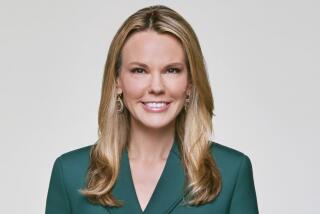Fixing NBC will be priority for new chief of NBC Universal
- Share via
When Comcast Corp.’s Steve Burke assembled his new executive team for NBC Universal, he followed an old management maxim: If it ain’t broke, don’t fix it.
Burke — who will become chief executive of NBC Universal when the Philadelphia-based cable giant assumes control of the company, most likely early next year — nonetheless will be spending a lot of time trying to fix one part of the sprawling media enterprise that is broken: the NBC broadcast network.
“Turning around the broadcast network will be one of the top priorities,” said Matthew Harrigan, media analyst with Wunderlich Securities. “Comcast does extremely well with the block-and-tackle businesses, but the network and film studio will be new for them. These are high-cash-burn businesses that need a lot of investment. And spending money like that hasn’t been Comcast’s style or nature before.”
Once boasting such hits as “Friends,” “Frasier,” “ER” and “The West Wing,” NBC regularly threw off more than $600 million a year in profit. But the network has struggled in the ratings in recent seasons and last year ran an operating loss of about $400 million, Harrigan said.
The swing illustrates the profit and peril of a hit-driven business such as network television. Get the right shows and networks can charge higher rates for advertising, which flows directly to the bottom line. Pick shows that don’t work, or load up on expensive sports contracts, and the costs quickly outstrip revenue.
Burke is expected this week to unveil his management lineup for NBC Universal, which will install two experienced TV executives at the broadcast network. Robert Greenblatt, former Showtime entertainment president, will be in charge of programming. Ted Harbert, who runs Comcast’s Los Angeles-based cable channels, including E!, will be responsible for the business functions, including advertising sales and television stations.
The selection of Greenblatt, who transformed Showtime with such unconventional shows as “Weeds,” “Dexter” and “The Tudors,” sends a message that Comcast intends to invest considerable resources to restore the plume to the peacock. Before he joined Showtime, Greenblatt was a top executive at Fox, helping develop “The X-Files,” “Ally McBeal,” “Melrose Place” and “The Sopranos” (the last of which ended up on HBO).
Comcast executives have assured Greenblatt that he will be given the time and money to rebuild NBC, according to people familiar with the discussions.
He might need it. NBC has been laboring this season to recover from Jay Leno prime-time debacle by restocking the 10 p.m. hour with dramas. But several new shows, including “Outlaw,” “Chase” and “Undercovers,” have stumbled. NBC’s “Sunday Night Football” and its huge audiences have kept the network in the ratings game.
For the most part, however, Burke will be relying on a mix of senior NBC Universal and Comcast executives.
Universal Studios President Ron Meyer, NBC Sports Chairman Dick Ebersol, NBC News President Steve Capus and CNBC President Mark Hoffman will all retain their portfolios. Burke also sought to keep in the fold the two executives who run NBC’s highly profitable cable television group, Bonnie Hammer and Lauren Zalaznick, giving them additional duties.
Hammer, who oversees USA Network and Syfy, will gain responsibility for Comcast’s cable channels E! and G-4. Zalaznick, who heads Bravo and Oxygen, will add Comcast’s Style cable channel and take over NBC Universal’s Miami-based Spanish-language network Telemundo and bilingual cable channel mun2.
In recent years, NBC’s cable channels — USA Network, Syfy, Bravo, MSNBC and CNBC — have generated more than $1 billion a year in profit, propping up the company financially even as the network and movie studio faltered. In his analysis, Harrigan estimated the asset value of USA at $11.7 billion, the Syfy channel at $6.3 billion and CNBC at $3.9 billion.
By contrast, Harrigan valued the NBC network at a “negative $600 million,” although he calculated that the NBC stations were worth $1.8 billion.
Burke did not craft a streamlined structure, signaling that he instead intends to be a hands-on manager. He will have at least 10 people reporting directly to him, which ensures that he will be deeply involved in key decisions, including negotiations with cable operators, sports leagues and powerful technology companies such as Apple Inc. and Google Inc.
Comcast, already the nation’s largest cable operator and Internet service provider, is awaiting approval from the U.S. Justice Department and the Federal Communications Commission for the merger. When the transaction closes, Comcast will own 51% of NBC Universal, and current owner General Electric Co. will retain 49%.
Industry observers expect that regulators will place several conditions on their approval of the merger, which would make Comcast the nation’s largest entertainment company. Many expect the government will require guarantees that Comcast will not withhold or jack up the price of NBC programming for rival cable and satellite TV operators, such as Time Warner Cable and DirecTV, or Internet video services.
Comcast announced Monday that it was introducing an application to make its own Internet video delivery system, Xfinity TV, accessible on Apple’s iPad and iPhone.
Finding ways to make Internet video profitable will be chief among Burke’s priorities. But he will encounter other issues too, such as how much NBC should bid to secure the 2014 and 2016 Olympics. This year NBC missed its revenue estimates and lost about $150 million on its broadcasts of the Vancouver, Canada, games.
He must also weigh whether to sell the Universal theme parks division, which is overseeing a $3-billion real estate development project that would add 3,000 homes to the hills surrounding Universal Studios in Los Angeles.
So far Burke’s structure eliminates just two senior executives of NBC Universal — Chief Executive Jeff Zucker and the chairman of the television group, Jeff Gaspin, who took over NBC programming in July 2009. Media analyst Harrigan said in a recent report that Zucker was something of a “defeatist” because he sought to downplay the prospects of the broadcast business.
But Burke, Harrigan noted, was raised in the broadcasting business. His father, Dan Burke, the legendary co-head of the Capital Cities television group, also took over a troubled company, ABC, at a time when the broadcast networks were ending their oligopoly. The younger Burke spent the first part of his career at Walt Disney Co. and was running ABC’s television group by the time he left Disney in 1998 to join Comcast.
“In this sense, Burke is the antithesis of Zucker, with his Disney and Capital Cities-ABC family background,” Harrigan said. “Hiring Greenblatt is a nice coup for Comcast and NBC, and to some extent it will be up to Greenblatt also to be the antithesis of Jeff Zucker.”
Burke and Greenblatt “must demonstrate that they are talent-friendly and open to the creative community,” he said. “They’ve got to repair those relations and be careful not to burn through a ridiculous amount of money. They need to get NBC to the point where it is at least a break-even proposition.”
More to Read
The biggest entertainment stories
Get our big stories about Hollywood, film, television, music, arts, culture and more right in your inbox as soon as they publish.
You may occasionally receive promotional content from the Los Angeles Times.











